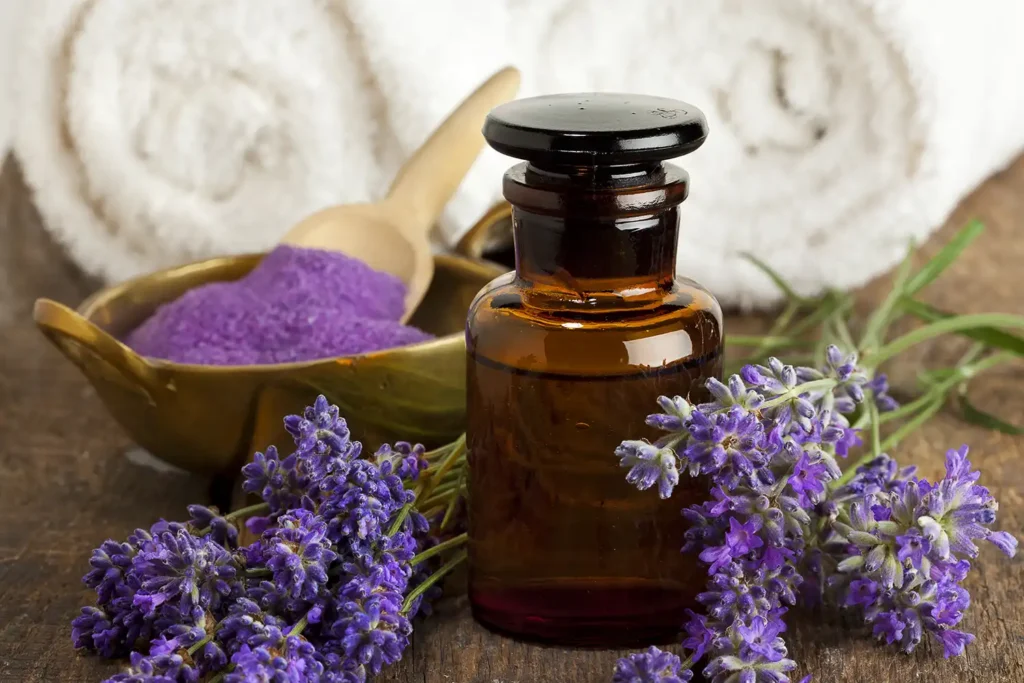Lavender essential oil, renowned for its soothing fragrance and versatile benefits, has been a staple in herbal medicine for centuries. Extracted through steam distillation from the flowers of the Lavandula angustifolia plant, this oil is celebrated for its calming, therapeutic properties.
Its use dates back to ancient civilisations, where it was valued for its healing and purifying abilities. Today, lavender is a popular choice in aromatherapy, skin care, and holistic wellness practices, owing to its calming effects and its natural ability to alleviate stress, improve sleep, and support overall health.
In this post, we’ll explore the essence of lavender oil benefits, unveiling its rich history and the reasons behind its enduring popularity in various wellness and therapeutic applications.
What is Lavender Essential Oil?
Lavender essential oil (also known as Lavandula angustifolia essential oil) is a highly concentrated plant extract, famously known for its soothing scent and therapeutic properties. It is obtained primarily through steam distillation of the flowers of the Lavender plant (Lavandula angustifolia), a member of the Lamiaceae (mint) family.
This process captures the plant’s volatile aromatic compounds, resulting in an oil rich in linalool and linalyl acetate, known for their relaxing and anti-inflammatory effects.
The oil’s versatility is evident in its wide range of uses, from aromatherapy and skin care to natural remedies for stress, sleep disturbances, and minor wounds. Its gentle nature makes it suitable for many, positioning it as a staple in aromatherapy.
A Brief History of Lavender’s Use
Lavender’s history as a therapeutic and aromatic plant spans thousands of years, with its origins rooted in ancient civilisations.
The Egyptians used lavender in their mummification processes and as a perfume;
The Romans appreciated it for its fragrance, bathing, cooking, and air purification properties;
It was a staple in herb gardens in medieval Europe, valued for its medicinal and antiseptic qualities.
Lavender also found its place in folklore and was believed to ward off evil spirits. By the 17th century, it became popular in England for its scent and was used in soaps and potpourris.
Over the centuries, lavender’s use has evolved, but its core properties as a soothing, calming agent have remained a constant, making it a timeless and revered plant in the history of natural remedies and aromatherapy.
The Science Behind Lavender Oil
The efficacy of lavender essential oils is rooted in their complex chemical makeup, which includes over 100 known compounds. The primary constituents, linalool and linalyl acetate, are credited with most of its therapeutic effects.
These compounds interact with the central nervous system, exerting a calming influence that reduces anxiety and promotes relaxation. Studies have also highlighted lavender oil’s anti-inflammatory, antioxidant, and antimicrobial properties, making it effective in healing minor burns, cuts, and skin irritations.
Recent research delves into its potential impact on neurological health, suggesting benefits of mood enhancement and cognitive function. This scientific understanding of lavender essential oil validates its traditional uses and opens new avenues for its application in modern Complementary and Alternative Medicine practices.
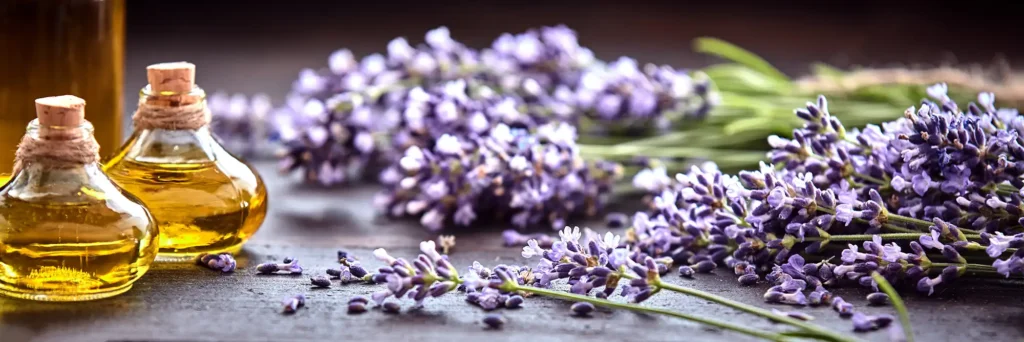
Top Health Benefits of Lavender Oil
Lavender offers many benefits with its rich aromatic profile and therapeutic compounds. Its versatility makes it a highly sought-after remedy in various aspects of health and wellness.
Let’s explore some of the top health benefits of lavender oil.
Natural Stress and Anxiety Reliever
Lavender essential oil is highly esteemed for its natural stress-relieving and anxiolytic properties. Its calming scent directly impacts the limbic system, the brain’s emotional centre, helping to reduce feelings of stress and anxiety.
Clinical studies have consistently shown that inhaling lavender oil or using it in aromatherapy can significantly lower anxiety levels, create a sense of calm, and reduce the physiological signs of stress, such as elevated heart rate.
Lavender oil works to stimulate the immune system, boost mood, improve sleep and fight stress. Its ease of use, whether diffused, applied topically, or used in a bath, makes it a popular and effective remedy for those seeking a gentle yet powerful approach to managing everyday stress and anxiety.
Tip… Try blending Lavender and Ho Wood oil for a relaxing yet uplifting blend.
Aiding Sleep and Insomnia
Lavender essential oil is a natural sleep enhancer, widely recognised for its ability to improve sleep and combat insomnia. Its sedative properties stem from its ability to soothe the nervous system, promoting relaxation and tranquillity.
Studies have shown that use before bedtime can help individuals fall asleep more easily and enhance the quality of sleep, leading to a more restful and uninterrupted night. This makes it an ideal, non-invasive aid for those struggling with sleep disturbances.
Incorporating lavender into bedtime routines, such as adding a few drops to a diffuser or pillow, can create a calming atmosphere conducive to a good night’s sleep.
How Lavender Improves Sleep Quality
The primary compounds in lavender, such as linalool and linalyl acetate, are inhaled and interact with the brain’s neurotransmitters, reducing agitation and promoting relaxation. This relaxation response prepares the body for sleep, making it easier to fall asleep and enter deeper restorative sleep stages.
Additionally, lavender’s soothing aroma creates a peaceful bedroom environment, further aiding in reducing sleep disturbances and night-time awakenings. Regular use of lavender at bedtime can improve overall sleep patterns, contributing to better health and well-being.
Antioxidant Properties and Disease Prevention
Lavender essential oil is a potent source of antioxidants, which play a crucial role in protecting the body from oxidative stress and related diseases. These antioxidants neutralise free radicals and unstable molecules that can damage cells and contribute to ageing and various health issues, including heart disease and cancer.
The oil’s antioxidant activity not only helps fortify the body’s natural defence system but also aids in reducing inflammation, a key factor in many chronic diseases. Incorporating lavender into daily wellness routines can thus be a proactive approach to disease prevention and maintaining overall health.
Lavender’s Role in Combating Free Radicals
Lavender oil’s effectiveness in combating free radicals lies in its rich composition of antioxidants like linalool and linalyl acetate. These compounds help scavenge and neutralise free radicals, the unstable atoms that can cause cell damage, leading to ageing and various diseases.
By mitigating oxidative stress, lavender oil may contribute to the prevention of cellular damage and inflammation, which are common pathways for many chronic conditions. Regular use of lavender oil, therefore, can be a supportive strategy for maintaining cellular health and preventing the onset of diseases associated with oxidative stress.
Potential in Diabetes Management
Emerging research suggests that lavender essential oil may benefit diabetes management. Studies indicate that its antioxidant and stress-relieving properties may help reduce stress. Additionally, it has shown promise in regulating blood sugar levels and improving insulin sensitivity.
While it is not a substitute for conventional diabetes treatment, it may be a complementary approach to help those managing their condition. These findings open new possibilities for lavender oil benefits in the holistic management of diabetes and its related symptoms.
Enhancing Skin and Hair Health
Lavender essential oil is a boon for skin and hair health due to its antiseptic, anti-inflammatory, and soothing properties. Using lavender oil for skin may help treat acne, reduce inflammation, and accelerate the healing of minor burns and cuts. Its moisturising effect also aids in soothing dry skin and eczema.
In hair care, lavender oil promotes scalp health, potentially reducing dandruff and supporting hair growth. Its calming scent adds to the overall experience of using it in skincare and haircare routines, making it a natural and pleasant choice for maintaining healthy skin and promoting hair growth.
Application Tips for Skin and Hair
For effective use of lavender oil on skin and hair, consider these tips:
Dilution: Always dilute lavender oil with a carrier oil (like Coconut oil or Jojoba oil) before applying it to the skin or scalp to prevent irritation.
Spot Treatment: Apply diluted lavender oil directly to blemishes or minor skin irritations for a soothing effect.
Facial Care: Add one or two drops to your regular moisturiser or night cream for added benefits.
Hair Scalp Massage: Mix with a carrier and massage into the scalp to promote hair health. Leave it on for a few minutes before washing as usual.
Remember, a patch test is recommended to ensure no allergic reactions occur.
Relief for Headaches and Pain
Lavender essential oil is widely recognised for its effectiveness in alleviating headaches and various forms of pain. Its analgesic properties make it a natural remedy for tension headaches, migraines, and muscle aches.
Applying diluted lavender oil to the temples or affected areas can provide quick relief by reducing inflammation and soothing pain.
Its calming aroma also contributes to relaxation, which can be particularly beneficial in stress-related headache relief. For those seeking a natural, non-pharmacological approach to pain management, lavender oil may offer a gentle yet effective solution.
Methods of Using Lavender for Pain
To utilise lavender oil for pain relief, consider these methods:
Topical Application: Mix lavender oil with carrier oil such as sweet almond oil and apply directly to the affected area for muscle aches or headaches. Gentle massage can enhance its effectiveness.
Aromatherapy: Use lavender oil in a diffuser or inhale a couple of drops directly from a handkerchief to alleviate headache pain and promote relaxation.
Warm Compress: Add a few drops of lavender oil to a warm, damp cloth and apply it to the painful area for soothing relief.
Bath Soak: Add several drops of lavender oil to a scoop of bath salts and sprinkle into running water to enjoy a warm bath for full-body relaxation.
These methods can be adjusted according to personal preference and the specific type of discomfort being addressed.
Lavender Oil for Improved Brain Function
Lavender oil is gaining attention for its potential to enhance brain function. Studies suggest that its aroma may help calm the central nervous system, leading to improved concentration, clarity, and cognitive performance.
The inhalation of lavender oil has been linked to reduced stress and anxiety, often barriers to effective thinking and problem-solving. Its potential neuroprotective properties may also help support brain health and guard against cognitive decline.
Incorporating lavender oil into daily routines, especially during work or study sessions, can be a simple yet effective way to boost mental performance and overall brain health.
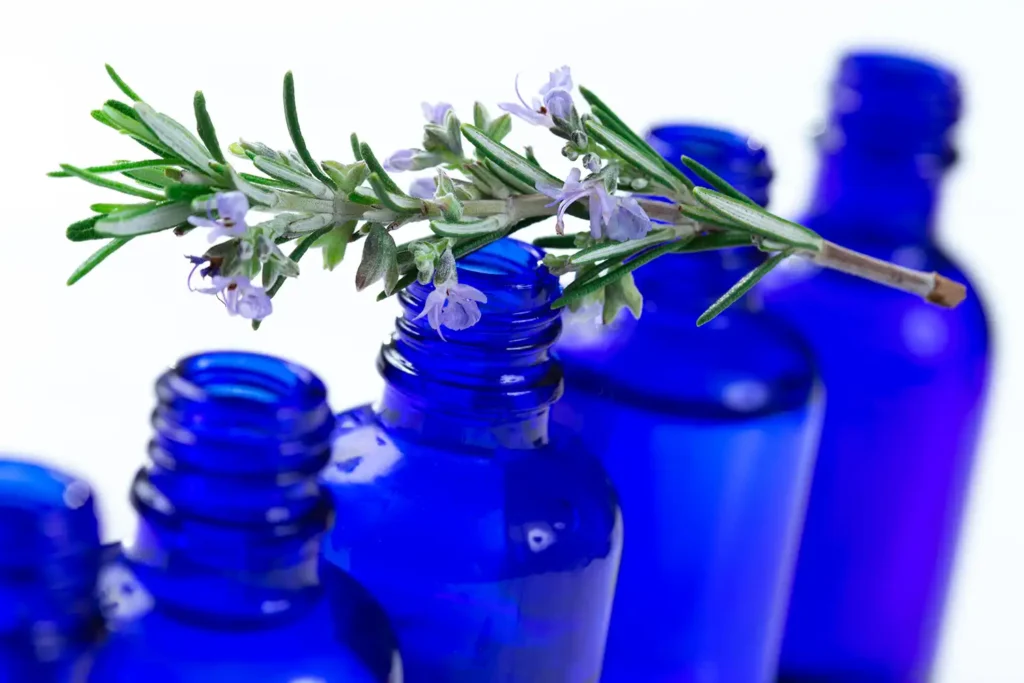
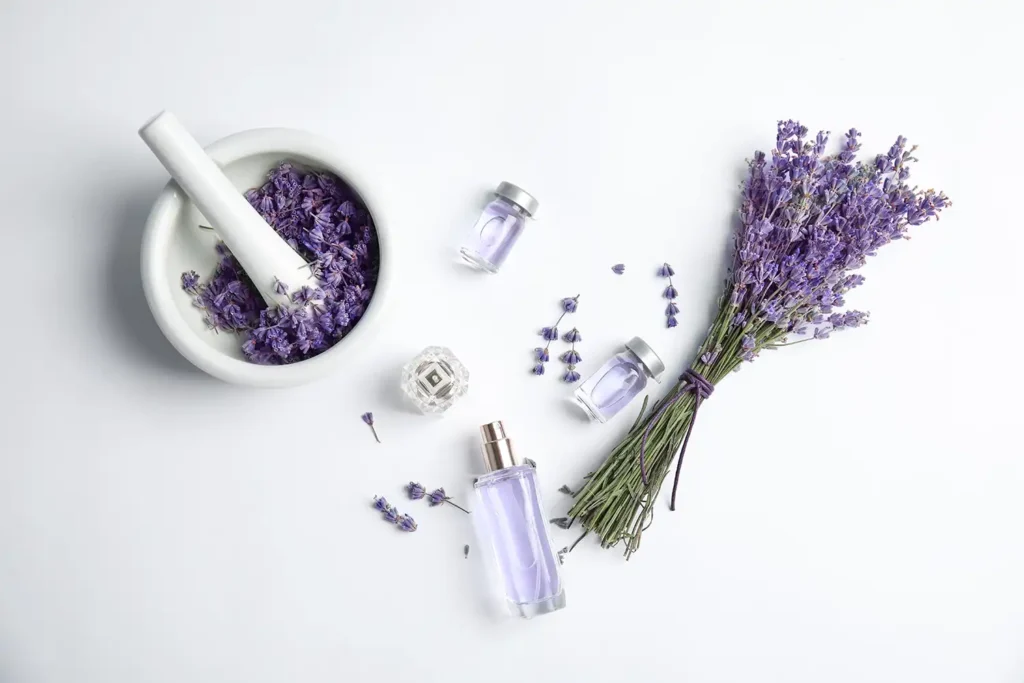
How to Use Lavender Essential Oil
Lavender essential oil can be used in various ways to harness its therapeutic benefits
Topical Application
Topical application is a popular way to use lavender essential oil for its direct benefits on the skin and body. To safely apply lavender oil:
Dilute with a Carrier Oil: As with all essential oils, always mix with carrier oil (such as coconut oil or jojoba oil) to prevent skin irritation. A general guideline is to use two drops of lavender oil per 10ml of carrier oil.
Apply to Affected Area: Gently massage the diluted oil onto the desired area to relieve skin irritations, muscle aches, or headaches.
Use in Skincare: Add diluted lavender oil to lotions or creams for added benefits in treating acne, soothing eczema, or enhancing overall skin health.
Patch Test: Before widespread use, do a patch test on a small skin area to ensure no allergic reaction.
Topical application allows for targeted relief and is an effective way to enjoy lavender essential oil’s soothing and healing properties.
Aromatherapy and Diffusion
Aromatherapy and diffusion are effective methods for enjoying the calming benefits of lavender essential oil:
Diffusing: Use an oil diffuser to disperse lavender oil into the air. Diffusing essential oils is ideal for creating a relaxing environment in your home or office. You can diffuse it on its own or create a blend with other essential oils.
Direct Inhalation: For a more immediate effect, add a few drops of oil onto a cloth or cotton ball and inhale.
Aromatherapy Jewellery: Wear aromatherapy jewellery, such as a necklace or bracelet, with a drop of lavender oil to enjoy its benefits throughout the day.
Steam Inhalation: Add a few drops of lavender oil to a bowl of hot water and inhale the steam quickly and effectively to relieve stress or congestion.
These aromatherapy practices leverage the soothing scent of lavender oil to promote relaxation, reduce stress, and enhance mood.
Incorporating into Daily Routines
Integrating lavender aromatherapy into daily routines is simple and can significantly enhance overall well-being:
Morning Ritual: Start your day by adding lavender oil to your shower gel or body lotion for a calming effect.
Stress Relief at Work: Keep a bottle of lavender oil at your desk for occasional inhalation or use in a personal diffuser to manage work-related stress.
Relaxing Evenings: Add lavender oil to a diffuser in the evening to create a tranquil atmosphere at home, aiding in relaxation and stress reduction.
Bedtime Routine: Apply one or two drops of lavender oil to your pillow or use it in a bedroom diffuser to promote better sleep quality. Just be aware – at bedtime, any more than two drops may become a stimulant for some. Less is more…!
By making lavender oil a part of your life, you can enjoy its calming benefits throughout the day, contributing to improved mood, reduced stress, and better sleep.
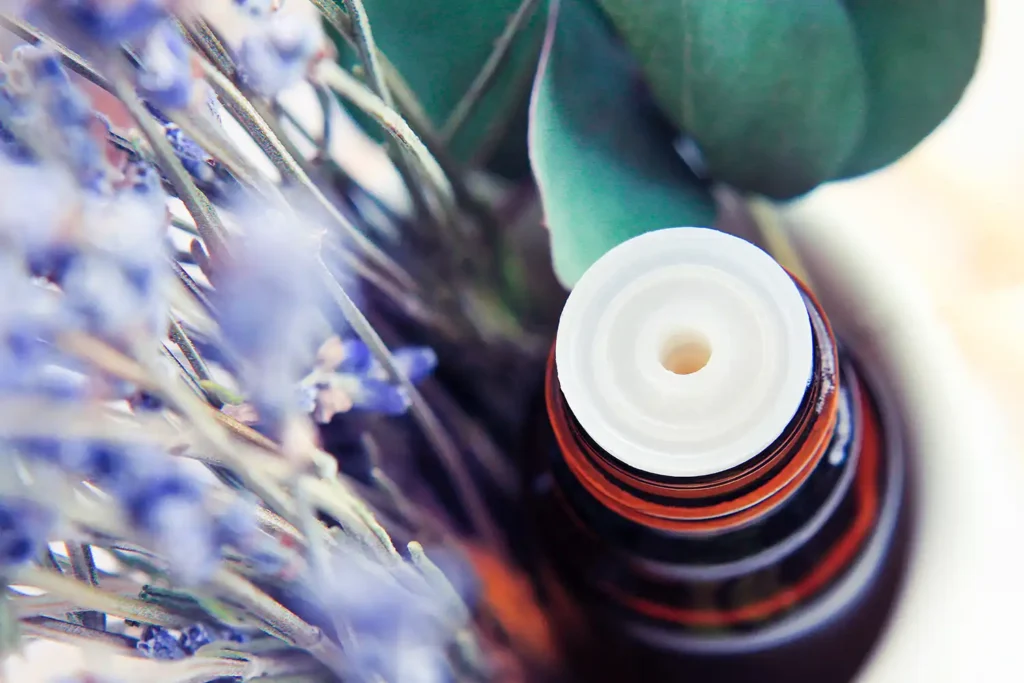
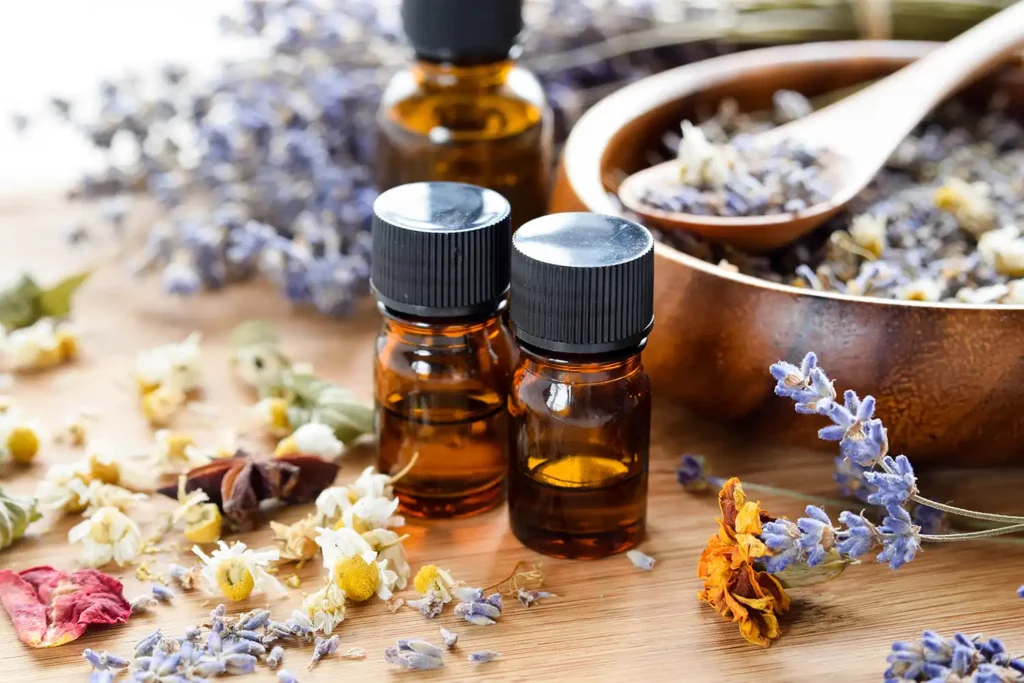
Precautions and Side Effects
While lavender essential oil is generally safe for most people, it’s important to be aware of potential precautions and side effects when using any essential oils.
Understanding Safe Usage
Dilution: Always dilute essential oils with a carrier oil such as coconut oil before topical application to avoid skin irritation.
Patch Test: Before applying essential oils, you should always conduct a patch test before use.
Ingestion: Ingesting Lavender oil is not recommended. Essential oils can be toxic.
Pregnancy and Breastfeeding: Pregnant or breastfeeding women should consult a healthcare professional or qualified aromatherapist before using lavender oil.
Potential Interactions and Considerations
Allergic Reactions: Some individuals may experience allergic reactions to lavender oil. Discontinue use if you notice any signs of an allergic response.
Children and Infants: Use lavender oil with caution around young children and infants, and always in a diluted form.
Sourcing Quality Essential Oils: There are many retailers selling lavender oils, but make sure to buy pure lavender essential oil from a trusted supplier.
Being mindful of these precautions can help ensure a safe and beneficial experience when using essential oils.

Final Thoughts
Lavender essential oil stands out as a versatile and gentle natural remedy, offering a range of benefits for mind and body health. From reducing stress and anxiety to improving sleep and skin health, its applications are diverse and widely accessible.
While it is generally safe for most people, understanding the proper usage and potential precautions is crucial for a positive experience.
Whether used in aromatherapy, as a topical application, or as part of daily routines, lavender oil can be a valuable addition to anyone’s wellness toolkit. Embracing its soothing properties can lead to enhanced well-being and a more balanced lifestyle.


